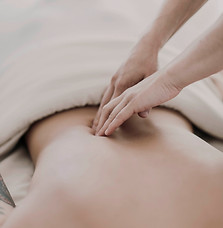
It's time for your Thrival
The foundation of RESTORE is to empower you to feel safe enough in your body to recognise and claim your own inner authority, so you are led by your heart's innate wisdom and intuition.
RESTORE supports you to develop a better awareness of your internal nervous system states, strengthen your emotional regulation abilities, and cultivate secure and satisfying relationships.
If you happened to stop by on your journey of Awakening, RESTORE can support you in grounding and regulating so your Awareness becomes a path of integration, not exhaustion - allowing your body to safely hold more of who you truly are.
Feeling safe in your body, first
As human beings, we are wired for connection - feeling safe with others is not just comforting, it’s a biological necessity. Yet true co-regulation begins with ourselves. To support another’s sense of safety - especially a child’s or a dysregulated client's - we must first cultivate our own.
Our nervous system is built to move in and out of stress and recovery. But when life is out of balance, we often get stuck in survival states, where everything feels like a threat. This constant hyper- or hypo-arousal drains our energy, health, and ability to live in the present.
Learning self-regulation changes that. By understanding and working with the Autonomic Nervous System, we can shift from surviving to truly living. Self-regulation allows us to:
-
Recognise and release old patterns and beliefs.
-
Reduce shame around our body’s survival responses.
-
Return more quickly to calm when stress arises.
-
Build emotional and physical resilience.
At RESTORE, our sessions and programs give you the tools to access this resilience. You’ll learn to:
-
Trust and respond to your body’s signals.
-
Develop patience and awareness in relationships.
-
Respect your body’s innate wisdom to protect you.
With practice, you’ll spend more time in presence, less time in stress - and discover what it feels like to be safe enough to thrive.
AWAKENING WITHOUT OVERWHELM
Spiritual awakening can be profound, but the surge of energy often overwhelms the body and mind. Without nervous system support, the process can feel chaotic and destabilising. Restore can support you in grounding and regulatin your body and mind so your Awakening becomes a path of integration, not exhaustion - allowing your body to safely hold more of who you truly are.

In Restore sessions, we blend psychosomatic and polyvagal-informed approaches to help your body feel seen, safe, and supported. Psychosomatics is at the heart of every session - gently exploring how the body holds what the mind cannot.
Through somatic inquiry, we listen to physical sensations as messengers of deeper emotional and energetic patterns, allowing your body to speak, release, and soften at its own pace.
Tani is a student of Vadym Sanzharov, bringing his teachings into her work to deepen body awareness, energy flow, and somatic understanding.
BODYWORK
One of the great strengths of The Polyvagal Theory is how easily it works alongside many other therapeutic models. By focusing on the body’s Vagus Nerve and physiological responses behind our emotions and relationships, it deepens and enhances the different approaches we draw on at Restore:
"The Polyvagal Therapy is not a specific technique but a way of thinking about therapy through the prism of the autonomic nervous system. It's an invitation to be creative, to constantly adapt, and to trust the deep wisdom of the body and heart in healing life's wounds."
Dr Stephen Porges, Founder of The Polyvagal Theory
Why The Polyvagal Theory?
Why Psychosomatics?
Your body isn’t the problem - it’s the storyteller.
When the mind can’t process something, the body holds it- tension, fatigue, anxiety, or shutdown all carry intelligence. In my sessions, we combine psychosomatic insight, vagus nerve support, and polyvagal-informed bodywork to help your body feel seen, safe, and supported.
Psychosomatics recognises that body and mind are not separate. When experiences are too overwhelming for the mind, the body carries them. Through gentle inquiry, we explore physical sensations, tensions, and patterns that may have emotional or energetic roots.
Your body speaks its own language —- this work is about learning to listen. Psychosomatic work pays attention to:
-
Chronic or unexplained tension
-
Physical symptoms that resist standard treatment
-
Posture, breath, and tone of voice
-
Internal sensations or images that arise without words
This is a compassionate, body-based approach - letting the body reveal what it has been holding and inviting it to soften at its own pace.
"That's what psychosomatics is about.
Not just healing the body - but giving a voice to everything you've had to silence."
Vadym Sanzharov, Founder of Simple Psychosomatics


.png)

